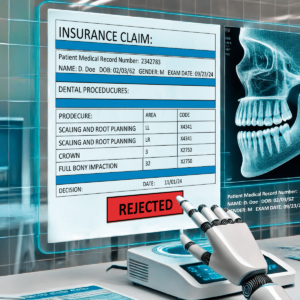Joshua Rubin, DDS, and Richard Ricci, DDS, discuss some of the impacts of artificial intelligence on the dental industry.

Dr. Rubin: It’s no secret that dealing with insurance companies is a major part of dentist’s daily work. Do you anticipate that AI will lead to more denials from insurance companies?
Dr. Ricci: Absolutely, and it’s already happening. Insurance companies are using AI against us. For instance, they employ AI to measure the distance from the CEJ to the alveolar crest. If the measurements don’t meet their preset thresholds, AI automatically denies approval for SRP without any human review of x-rays or probing depths.
Dr. Rubin: Wow. Frankly, I had no idea. I always assumed there was a dentist, at some level, reviewing the x-rays and probing depths. It never crossed my mind that insurance companies were replacing us with AI software for preapprovals.
Dr. Ricci: Unfortunately, they are. Insurance companies are relying on AI to work against us every day.
Dr. Rubin: That’s incredible. And you know what? I’m not even surprised anymore—it feels like insurance companies are always one step ahead of us.
Dr. Ricci: Dentists must become knowledgeable about dental AI if we’re going to stay ahead and stand up to the insurance companies.
Dr. Rubin: I couldn’t agree more. Honestly, it’s frustrating to realize that no clinician is reviewing my claims on the insurance side. It already takes so much time to get even the simplest procedures approved, and having a direct doctor-to-doctor conversation with the insurance company is virtually impossible.
Dr. Ricci: For example, I’d like to ask you how you feel knowing that insurance companies are using AI to analyze the black and white pixels on your x-rays and calculating if there’s enough tooth structure to deny a crown approval.
Dr. Rubin: I had no idea AI could be used for something like this. I always assumed there was some level of clinician oversight involved.
Dr. Ricci: Insurance companies are leveraging dental AI, using a Decay Missing Filled (DMF) index algorithm as a basis for rejecting claims. If you’re curious, you can look it up on ChatGPT.
Dr. Rubin: Are insurance companies using AI on panoramic x-rays too?
Dr. Ricci: Yes, not only are they using AI on panoramic x-rays, but they often use it to downgrade claims—like reclassifying partial bony impactions to soft-tissue extractions.
Dr. Rubin: That’s quite a stretch for AI to make that kind of determination. Only the operating dentist knows whether they had to remove osseous structure for an extraction. I don’t see how AI could accurately make that call.
Dr. Ricci: You can’t make this stuff up.
Dr. Rubin: Do you know when insurance companies started using AI?
Dr. Ricci: Insurance companies first started using AI, which were not FDA-approved algorithms, in June 2021.
Dr. Rubin: And in this case, does the use of AI require an FDA approval?
Dr. Ricci: Ironically, not for insurance companies, because they aren’t using it as a “medical device.” When dentists use AI, however, the FDA classifies it as a medical device and requires an approval. It’s just another example of how the laws tend to favor insurance companies over us.
Dr. Rubin: So, how can dentists push back against AI-driven claims rejections from insurance companies?
Dr. Ricci: Great question. Even without in-depth knowledge of dental AI, dentists can submit digital images of fractured teeth along with their claims. This often triggers the insurance company’s AI system to flag the image for a mandatory human review. It will increase your chances for an approval.
Dr. Rubin: That’s a fantastic tip. Thank you.
Dr. Ricci: I’m glad you found it helpful. The SMILE Dx AI platform is a game changer for dentists. It empowers dentists to take back control from the insurance companies.
For more information, visit SMILE Dx’s website at smiledx.com.



